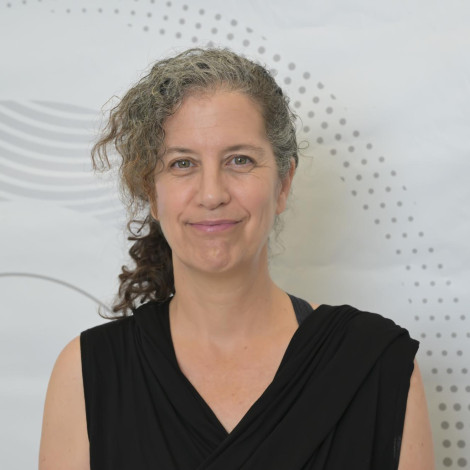
Prof. Sharon Gilaie-Dotan
CV
BSc - Mathematics and Computer Science @ Hebrew University of Jerusalem
MSc - Mathematics and Computer Science @ Weizmann Inst. of Science (Advisors Profs Rafi Malach and Shimon Ullman)
PhD - Neurobiology @ Weizmann Inst. of Science (Advisors Profs Rafi Malach and Shimon Ullman)
Post-doc @ Prof Geraint Rees's lab, Institute of Cognitive Neuroscience, UCL, London
Research
Visual motion, biological motion, face perception, object perception, visual system organization
Our lab focuses on understanding how neural processes in our brains result in visual perception and behaviour. We seek to understand how the visual system meets the challenges that the ever-changing dynamic 3D world confronts her with. Therefore we investigate how the visual system functions in lab-based and in less controlled environments (using both static and dynamic stimuli). We use fMRI to study brain activity, MRI to investigate brain structure, psychophysics to evaluate behaviour and compare to brain measures. We study healthy individuals but also developmental cases and brain damaged patients. Read more on our lab website at https://www.gilaie-dotan-lab.com/
Courses
82216 - Visual perception 1
82205 - Neurophysiology of the visual system 2
82501 - Vision science challenges (with Uri Polat, Yossi Mandel, and Yoram Bonneh)
Publications
(Full texts are available on our lab webpage at https://www.gilaie-dotan-lab.com/publications)
2018
Yitzhak N, Gilaie-Dotan S, Aviezer H. (2018). The contribution of facial dynamics to subtle expression recognition in typical viewers and developmental visual agnosia. Neuropsychologia, https://doi.org/10.1016/j.neuropsychologia.2018.04.035
2017
Gilaie-Dotan S, Doron R. (2017). Developmental visual perception deficits with no indications of prosopagnosia in a child with abnormal eye movements. Neuropsychologia, http://dx.doi.org/10.1016/j.neuropsychologia.2017.04.014
Axelrod D, Schwarzkopf DS, Gilaie-Dotan S, Rees G. (2017). Perceptual similarity and structural neural correlates of geometrical illusions. Scientific Reports, http://www.nature.com/articles/srep39968
2016
Grubb M, Tymula A, Gilaie-Dotan S, Glimcher P, Levy I. (2016). Neuroanatomy accounts for age-related changes in risk preferences. Nature Communications, Dec 13;7:13822, http://rdcu.be/nNPH
Gilaie-Dotan S. (2016). Visual motion serves but is not under the purview of the dorsal pathway. Neuropsychologia, 89:378-92 dx.doi.org/10.1016/j.neuropsychologia.2016.07.018
Gilaie-Dotan S, Ashkenazi H, Dar R. (2016). A possible link between supra-second open-ended timing sensitivity and obsessive-compulsive tendencies. Front Behav Neurosci, 10:127 http://journal.frontiersin.org/article/10.3389/fnbeh.2016.00127/full
Freud E*, Ganel T, Avidan G, Gilaie-Dotan S*. (2016) Dissociation between perception and action in developmental visual agnosia. Cortex, 76:17-27 http://dx.doi.org/10.1016/j.cortex.2015.12.006
* Corresponding authors
Gilaie-Dotan S. (2016). Which visual functions depend on intermediate visual regions? Insights from a case of developmental visual form agnosia. Neuropsychologia, 83:179-91 http://dx.doi.org/10.1016/j.neuropsychologia.2015.07.023
2015
Gilaie-Dotan S, Saygin AP, Lorenzi L, Rees G, Behrmann M. (2015) Ventral aspect of the visual form pathway is not critical for the perception of biological motion. Proceedings of the National Academy of Sciences U S A, 112(4):E361-70 http://www.pnas.org/content/112/4/E361.full
Lev M*, Ludwig K*, Gilaie-Dotan S*, Voss S, Sterzer P, Hesselmann G, Polat U. (2015) Training improves visual processing speed and generalizes to untrained functions. Scientific Reports, 4:7251 http://www.nature.com/articles/srep07251
* Equal first
2014
Gilaie-Dotan S, Tymula A, Cooper N, Kable JW, Glimcher P, Levy I. (2014) Neuroanatomy predicts individual risk attitudes. Journal of Neuroscience, 34(37):12394-401 http://www.jneurosci.org/content/jneuro/34/37/12394.full.pdf
Gilaie-Dotan S, Rees G, Butterworth B, Cappelletti M. (2014) Impaired numerical ability affects supra-second time perception. Timing and Time Perception, http://dx.doi.org/10.1163/22134468-00002026
Lev M, Gilaie-Dotan S*, Gotthilf-Nezri D, Yehezkel O, Brooks J, Perry A, Bentin S, Bonneh Y, Polat U. (2014) Training-induced recovery of undeveloped visual functions may be followed by improved perceptual functions: indication from adult with perceptual impairments. Developmental Science, 18(1):50-64 http://onlinelibrary.wiley.com/doi/10.1111/desc.12178/full
* Equal first and corresponding author
2013
Gilaie-Dotan S, Saygin AP, Lorenzi L, Egan R, Rees G, Behrmann M. (2013). The role of ventral visual “what” stream in motion perception. Brain, 136(Pt 9):2784-98 http://brain.oxfordjournals.org/content/136/9/2784
Gilaie-Dotan S, Hahamy-Dubossarsky A, Nir Y, Berkovich-Ohana A, Bentin S, Malach R. (2013). Resting state functional connectivity reflects abnormal task-activated patterns in a developmental object agnosic. NeuroImage, 70:189-98 http://www.sciencedirect.com/science/article/pii/S1053811912012359
Gilaie-Dotan S, Kanai R, Bahrami B, Rees G, Saygin AP. (2013). Neuroanatomical correlates of biological motion detection. Neuropsychologia, 51(3):457-63 http://dx.doi.org/10.1016/j.neuropsychologia.2012.11.027
2012
Gilaie-Dotan S, Harel A, Bentin S, Kanai R, Rees G. (2012) Neuroanatomical correlates of visual car expertise. NeuroImage, 62(1):147-53 http://dx.doi.org/10.1016/j.neuroimage.2012.05.017
Brooks J, Gilaie-Dotan S, Rees G, Bentin S, Driver J. (2012). Preserved local but disrupted contextual figure-ground influences in an individual with abnormal function of intermediate visual areas. Neuropsychologia, 50(7):1393-407 http://dx.doi.org/10.1016/j.neuropsychologia.2012.02.024
2011
Gilaie-Dotan S, Kanai R, Rees G. (2011) Anatomy of human sensory cortices reflects inter-individual variability in time estimation. Front Integr Neurosci, 5:76 http://journal.frontiersin.org/article/10.3389/fnint.2011.00076/full
Gilaie-Dotan S, Bentin S, Harel M, Rees G, Saygin AP. (2011) Normal form from biological motion despite impaired ventral stream function. Neuropsychologia, 49(5):1033-43 http://dx.doi.org/10.1016/j.neuropsychologia.2011.01.009
2010
Gilaie-Dotan S, Silvanto J, Schwarzkopf DS, Rees G. (2010) Investigating representations of facial identity in human ventral visual cortex with transcranial magnetic stimulation. Front Hum Neurosci, http://journal.frontiersin.org/article/10.3389/fnhum.2010.00050/full
Schwarzkopf DS, Silvanto J, Gilaie-Dotan S, Rees G. (2010) Investigating object representations during change detection in human extrastriate cortex. Eur J Neurosci, 32(10):1780-7 http://onlinelibrary.wiley.com/wol1/doi/10.1111/j.1460-9568.2010.07443.x/full
Silvanto J, Schwarzkopf DS, Gilaie-Dotan S, Rees G. (2010) Differing causal roles for lateral occipital cortex and occipital face area in invariant shape recognition. Eur J Neurosci, 32(1):165-71 http://onlinelibrary.wiley.com/doi/10.1111/j.1460-9568.2010.07278.x/abstract
Harel A, Gilaie-Dotan S, Malach R, Bentin S. (2010) Top-down engagement modulates the neural expressions of visual expertise. Cereb Cortex, 20(10):2304-18 http://cercor.oxfordjournals.org/content/20/10/2304.full
Gilaie-Dotan S, Gelbard-Sagiv H, Malach R. (2010) Perceptual shape sensitivity to upright and inverted faces is reflected in neuronal adaptation. NeuroImage, 50(2):383-95 http://dx.doi.org/10.1016/j.neuroimage.2009.12.077
2009 and earlier
Gilaie-Dotan S, Perry A, Bonneh Y, Malach R, Bentin S. (2009) Seeing with profoundly deactivated mid-level visual areas: Non-hierarchical functioning in the human visual cortex. Cereb Cortex, 19(7):1687-703 https://cercor.oxfordjournals.org/content/19/7/1687.full
Gilaie-Dotan S, Nir Y, Malach R. (2008) Regionally-specific adaptation dynamics in human object areas. NeuroImage, 39(4):1926-37 http://dx.doi.org/10.1016/j.neuroimage.2007.10.010
Gilaie-Dotan S, Malach R. (2007) Sub-exemplar shape tuning in human face-related areas. Cereb Cortex, 17(2):325-38 http://cercor.oxfordjournals.org/content/17/2/325.full
Gilaie-Dotan S, Ullman S, Kushnir T, Malach R. (2002) Shape-selective stereo processing in human object-related visual areas. Hum Brain Mapp, 15(2):67-79
Last Updated Date : 30/09/2024



